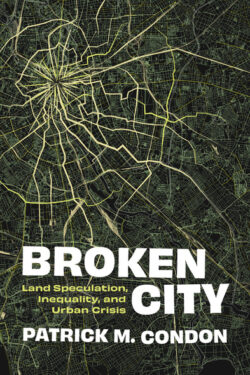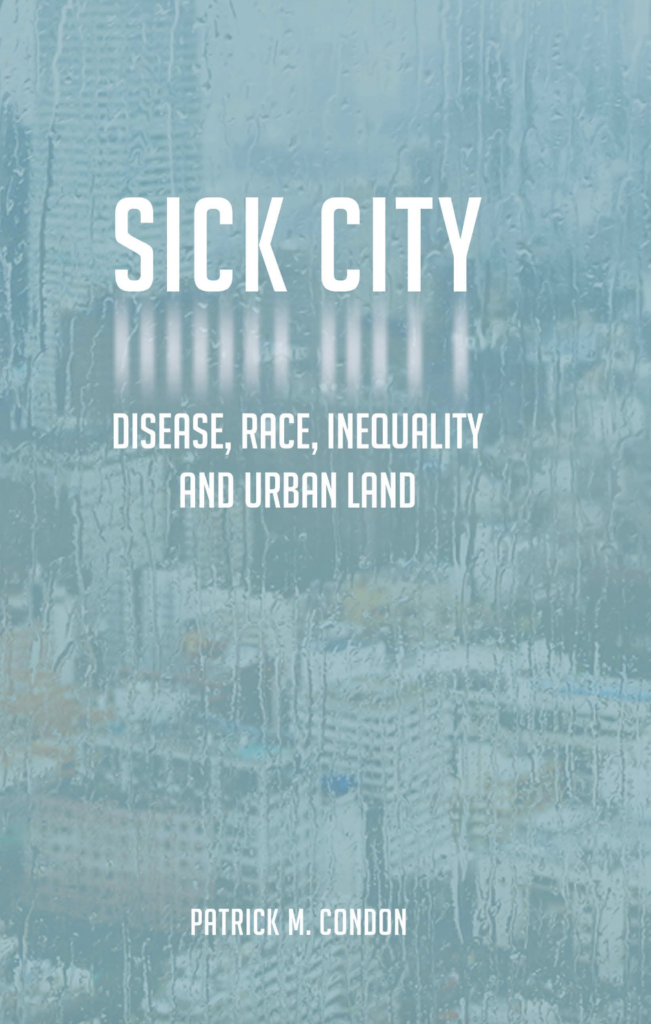When speculation destroys liveability
Broken City: Land Speculation, Inequality, and Urban Crisis
by Patrick M. Condon
Vancouver: UBC Press, 2024
$32.95 / 9780774869553
Reviewed by Ryan Mitchell
*

Patrick M. Condon‘s Broken City: Land Speculation, Inequality, and Urban Crisis takes a deep dive into global housing unaffordability, focusing on how unchecked land speculation precipitated the crisis. Condon, a seasoned urban planner, uses his extensive knowledge to explain these issues in an informative and comprehensive manner. His book doesn’t merely identify root causes of unaffordability, it’s also prescriptive by offering solutions to governments and hope for the future of our cities.
Condon starts by painting a vivid picture of land speculation which took off in a major way in the latter half of the 20th century. Investors (initially private real estate firms, but later extending to average homeowners) bought land for cheap and held onto it until its value raised significantly. Condon describes this process as generating passive income, as sitting on wealth accumulated via the success of a neighborhood’s prosperity (e.g. Manhattan gentrifying in the 1990s), does not produce social capital or reinvestments in the local community. Rather, private sector landlords and real estate investors began looking at urban land (in particular) primarily through a fiscal lens, with a huge ROI [Return On Investment] potential. Naturally, speculators would be interested in having land not only maintain, but increase its value significantly, over time. While this phenomenon initially widened a new market to the middle-class through cheap (and rapidly built) housing in the mid-20th century, it also became a victim of its own success. Affordable and livable land, especially in cities, became exceedingly scarce.
Unregulated land speculation drives up housing costs, making it hard for working and younger people in particular, to afford to rent (let alone purchase a home) in their own cities. This also creates a vicious cycle, as the more people who invest in real estate for their retirement, or children’s inheritance, the more they will naturally be opposed to any loss (depreciation) in the value of their housing investment. This is despite the common homeowning conventions parroted by older generations to their children and grand-children (“Buy a home, it’s the greatest investment you’ll ever make”), who are led to believe in the infallible promise of home ownership. Of course, many of these revelations are widely understood now, and since the COVID-pandemic struck the housing crisis has received more media coverage. Yet Condon’s account illuminates the crux of these issues and their spiderweb nature connecting back to land rent.

Condon doesn’t just talk about the financial side of things; he also delves into how land speculation widens social disparities in our communities. As speculators drove up land prices, in some of our biggest cities, low-income residents were pushed out of their neighborhoods. This displacement breaks up communities and forces people into less walkable and transit-oriented areas, further entrenching poverty and inequality. He provides an example from the pandemic, explaining how it was not mass transit in New York City which propelled infection rates in early 2020, despite a media panic blaming the subway system. In fact, most infections were spread by the people one lived and worked with; manual laborers working in factories, retail services and often those sharing multi-generational homes were at high risk. Meanwhile, tech workers based out of home offices downtown were largely safe from exposure and could isolate easily.

Despite the grim realities, Condon’s book is ultimately hopeful. He offers practical solutions and highlights success stories from cities (e.g. Vienna) that have managed to turn things around. One of his key recommendations is land value taxation, which would tax the value of the land itself rather than the buildings on it. This would discourage speculative holding and encourage productive use of land. Condon also champions community land trusts and other forms of collective ownership as ways to ensure affordable housing and prevent displacement. He believes that by involving local communities in the planning process, we can create cities that work for everyone, not just for those with the deepest pockets. Condon criticizes modern cities (and governments) for only looking to the private sector for below-market housing “solutions.” The private market won’t bring about our housing salvation, cities need to get back into the business of building affordable housing themselves, funded, for instance, by a land value tax.
Condon’s vision for the future of cities is inspiring. He believes these incremental changes by our cities can make targeted improvements with long-term public benefits. Investing in public spaces, green infrastructure, and community projects can help revitalize entire neighbourhoods and improve our cities’ livability and affordability.
Condon writes in a clear, accessible style that makes the daunting, highly politicized housing crisis topic approachable and understandable. Using real world examples, case studies, and graphics to illustrate his points, he makes the book both relatable and compelling. Condon’s book is a must-read for anyone interested in the future of our cities, and is a call to action; challenging us to rethink urban development and advocate for policies that put people first. Condon offers a hopeful vision for a more equitable and sustainable urban future.
*

Ryan Mitchell is an avid reader and part-time editor passionate about people’s stories, history, film, and cities. His background is in sociology and urban studies, and he enjoys volunteering with local cycling initiatives, film, and street festivals. In recent years, he gained experience as an editor for a UN-sponsored NGO called AlterContacts: Lockdown Economy, archiving small-business experiences facing the challenges of the pandemic. An Ontarian now based in Vancouver, Ryan enjoys exploring the rainy coast of BC and the Pacific Northwest and is working to become a city planner. [Editor’s note: Ryan Mitchell has previously reviewed books by Michael Fenn, Gordon McIntosh, and David Siegel (eds.), Perry Bulwer, Mary Soderstrom and Tamar Glouberman.]
*
The British Columbia Review
Interim Editors, 2023-25: Trevor Marc Hughes (non-fiction), Brett Josef Grubisic (fiction)
Publisher: Richard Mackie
Formerly The Ormsby Review, The British Columbia Review is an on-line book review and journal service for BC writers and readers. The Advisory Board now consists of Jean Barman, Wade Davis, Robin Fisher, Barry Gough, Hugh Johnston, Kathy Mezei, Patricia Roy, Maria Tippett, and Graeme Wynn. Provincial Government Patron (since September 2018): Creative BC. Honorary Patron: Yosef Wosk. Scholarly Patron: SFU Graduate Liberal Studies. The British Columbia Review was founded in 2016 by Richard Mackie and Alan Twigg.
“Only connect.” – E.M. Forster